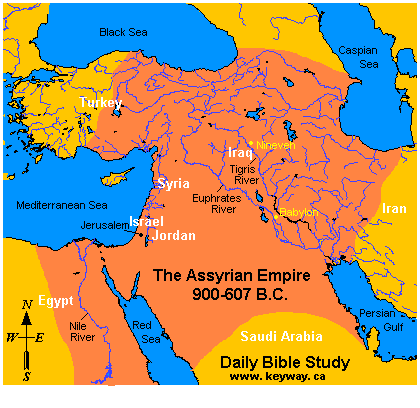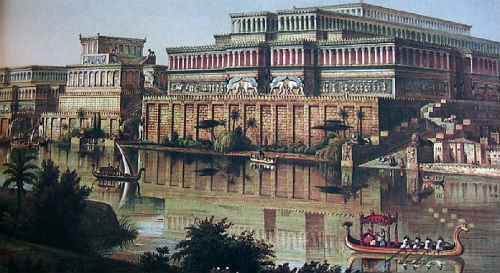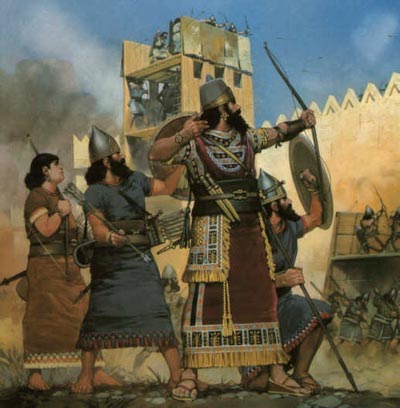by Neil Earle

Good morning, brethren.
It’s a good question, isn’t it? After all the excitement of Easter with 7 services in two and a half weeks and the best news we can ever hear – Jesus conquering death by his glorious resurrection thus making way for ours – what do we ministers have to say?
I have an idea: why not the book of Jonah?
We’ve all heard of Jonah and Jesus spoke of him. Jesus told his future executioners – the Pharisees and religious rulers – that the sign to them would be his resurrection from the grave after three days and nights like Jonah in the whale (Matthew 12:48).
More on that later. We should note in passing that the phrase “three days and three nights” does not necessarily mean our literal 72 hour period. Time measurements in the Bible are never as precise as we scientifically-minded moderns would like. Jesus began to preach when he was “about” thirty years of age” (Luke 3:23) and other numbers such as “forty” and the casualties mentioned in Samuel, Kings and Chronicles are obviously rounded off figures (1 Samuel 4:2).
We have to read a ancient text such as the Bible on its own terms. In truth, Jonah’s sign is more important than technical details of numerology, as we hope to show.

A little background on Jonah – he had been a successful prophet. His ministry had gone well. In the prosperous reign of King Jeroboam II (c. 782-753 BC) God had given Jonah the opportunity to announce the good news that Israel would expand its borders (2 Kings 14:23-25). As a native of Gath-heper, a town in the area later known as “the Galilee,” Jonah was overjoyed because perhaps this expansion would secure a buffer zone between Israel and the dreaded Assyrians to the north.
The Assyrians – now there was a name to reckon with.
These fearsome practitioners of the art of war were based in what we call Iraq today – there is still a Nineveh Province there. They had raided Israel in the previous century. Assyria’s King Shalmaneser III (858-824 BC) had received tribute around 841 BC and Adad-Nirari was banging at the gates of Damascus in 804 (Lasor, Hubbard and Bush, Old Testament Survey, page 207). Assyria’s swift-moving legions were the most dreaded military force in Jonah’s day and Nineveh was the capital of Assyria!

Some Assyrian kings believed in a policy of calculated terror. The Assyrian king Ashur-Nasir-Pal II (883-859 BC) inscribed his tactics on a stone monument: “I stormed the mountain peaks and took them…with their blood I dyed the mountains red like wool…The heads of their warriors I cut off, and I formed them into a pillar over against their city, their young men and their maidens I burned in the fire (Finegan, Light from the Ancient Past, pages 202-203). These warriors were the most feared of their era.
And what was Yahweh asking Jonah to do?
“The word of the Lord came to Jonah son of Amittai, Go to the great city of Nineveh and preach against it, because its wickedness has come up before me” (Jonah 1:1). Yahweh was asking Jonah to preach to these people? Impossible. Inconceivable! Jonah well knew Nineveh’s sins of violence (Jonah 3:8). Yes, this Assyrian mission was all too much for Jonah to handle. “Lord, you must be kidding, send me to North Korea instead,” we could almost imagine him saying.
Jonah’s name meant “dove” and here he was fleeing God’s directive. “Not me, Lord – find someone else!”
In times of stress, psychologists tell us, we react with either “fight” or “flight.” Jonah chose flight. “But Jonah ran away from the Lord and headed for Tarshish. He went down to Joppa, where he found a ship bound for that port. After paying that fare, he went aboard and sailed from Tarshish to flee from the Lord” (Jonah 1:3).
What a strange turn of events. A prophet trying to escape God’s presence by leaving the territory of Israel! The proud prophet (1:9) seems to have had a rather limited concept of God. Whether from a panicky fear of the Assyrians or from the shattering of his comfortable assumption that God loved Israel only – he hightailed it to Tarshish, perhaps Spain in the Western Mediterranean. But he was about to learn that God was a lot bigger than the Mediterranean, a lot bigger by far than he – an accredited prophet of Yahweh – had thought.
Jonah was about to learn that Yahweh’s writ did not stop at Israel’s borders. He would be faced with the uncomfortable fact that this God he served loved all people – yes, even the dreaded Assyrians.
The action continues: “Then the Lord sent a great wind on the sea, and such a violent storm arose that the ship threatened to break up” (Jonah 1:4).
Where was Jonah during this storm? Incredibly, he was in the hold of the ship fast asleep (verses 5-6). What was going through his mind? Was he perhaps curled up in the fetal position, a sure sign of great emotional stress? Perhaps it was fear and loathing toward the Assyrians or perhaps it was the psychic shock of a shattered worldview but he was clearly out of touch with reality.
Maybe his self-talk was driving him bonkers. “Isn’t Israel God’s nation, a special treasure above all nations (Exodus 19:5)? What is happening here? Why is God sending me to the dreaded Assyrians? This cannot be…do you mean to tell me that…God’s love for people extended beyond the borders of Israel?”
Yes it was. Entirely possible. And deep down Jonah perhaps suspected that this was the case (Jonah 4:2-3). Jonah had misread his country’s history. God had called Israel to be “a kingdom of priests” (Exodus 19:6). Their founding father had been commissioned for an international mission of mercy – “all peoples on earth will be blessed through you” (Genesis 12:3).
So Jonah was being challenged to stretch his thinking; to be inclusive, not exclusive; to be generous not religiously self-satisfied; to be not narrowly looking down on others.
Jonah may well have known all this, intellectually. But not emotionally. He may have been on a vessel but he was missing the boat. The text shows he is too self-absorbed to notice the seriousness of the storm. The sailors know they’re about to drown! They’re terrified. They have “done something religious” – they have been calling out to their gods, always a wise procedure when in trouble (Psalm 107: 23-37). The captain shakes Jonah awake: “Get up you sleeper and call on your god! Maybe he will take notice of us, and we will not perish” (Jonah 1:6).
Nope. Jonah remains obdurate. Revealed as the culprit, he self-righteously boasts: “I am a Hebrew and I worship the Lord, the God of heaven, who made the sea and the land” (v. 9). This is so ironic. The pagan sailors could well have asked: “If your God created the sea why did you think you could escape him on a boat?”
Ah – a logical question. But Jonah isn’t thinking logically. Neither do we in times of great mental and emotional turmoil. Jonah blurts out: “Throw me into the sea. All this is my fault!” Incredibly, those pagan sailors refuse. They have more respect for human life than the so-called man of God. What a scene!
Finally, events force them to do the deed but with great reluctance. They do it respectfully, reverently, invoking Yahweh’s name (v. 14). So look who’s religious! Further, when the storm subsides they offer sacrifices to the God of Israel (v. 16). What potential converts these rough seamen might have made! But Jonah is oblivious to such thoughts. He chooses extinction rather than accept God’s mission
We all know what happens next. Mercifully, God wasn’t through with his servant yet. A great fish swallowed up Jonah, the man of God. A man of God with head knowledge without proper heart knowledge.
But, he was still Yahweh’s servant and inside the great fish, Jonah prayed a beautiful prayer of repentance (Jonah 2:1-9). Notice the lessons here. His “death” in the sea reconciled the sailors to God (Jonah 1:16). His “resurrection” from the Pit – the belly of the fish – would result in the salvation of Nineveh (Jonah 3:10). In all of this, the recalcitrant Hebrew was an amazing foreshadowing of the Messiah, also from Galilee, Jesus the Christ (Matthew 12:40). But perhaps an anti-Messiah would be a better term for Jonah.

Now many dismiss Jonahs story as myth. They joke: “Can you swallow the tale of Jonah in the whale?”
But the brilliant Old Testament historian Roland K Harrison compiled more than one example of sailors who have been swallowed by great fish and lived to tell the tale (Introduction to the Old Testament, pages 906-908). He also shows how archaeology – which almost began in the 1800s with excavating the ruins of Nineveh – confirms that Nineveh could have held at least 175,000 people (page 909). And Douglas Stuart has pointed out that the Assyrian zeal to repent may have been hastened by one thing ancient peoples feared exceedingly – an eclipse. According to the meticulous records of the Assyrian themselves, an eclipse occurred on June 15, 763 BC, well within the lifetime of Jonah (New Bible Commentary, page 820-821).
Yes, historic details are important in themselves but not as important as the real lesson of Jonah – his “sign” for us today. The Ninevehites repented. Someone came back to them from the grave of a big fish and preached repentance…and they heeded. That was Jesus’ point in Matthew 12 – the Ninevehites repented at the warning of Jonah but the Jewish leaders would not, “even if one would come back from the dead Luke 16:30).”
Jonah’s resurrection and call to repentance was a sign of what the Jewish leadership should have done – turn to God because a greater than Jonah was there. What a sign! What a lesson! But what about us today?
Romans 15:4 tells us Old Testament, “was written to teach us, so that through endurance and the encouragement of the Scriptures, we might have hope.”
What is immediately hopeful about Jonah’s story is that it shows us in stark terms that yes, indeed, Yahweh was concerned about the cities of Jonah’s day just as he is concerned about the people in our cities today. The biblical witness is consistent. Abraham pleaded for the life of Sodom (Genesis 18:23-32). Jeremiah urged his countrymen to“seek the peace of the city.” Jesus famously wept over Jerusalem (Luke 19:41-44), and Jonah…well, Jonah had some lessons to learn.
But what a great text Jonah is for us today, we New Testament Christians who are continually challenged to keep growing, to keep breaking new ground in our relationship with God. Studying Jonah shows how we need to stay properly humble before God’s overwhelmingly unfathomable love. God’s mission of mercy is for everyone who will hear – including the Assyrians.
Charles van Engen of Fuller Seminary summarizes at least four lessons that Old Testament prophets “on mission” leave for us today.
First, as imperfect as we are (like Jonah) we are God’s chosen instruments to reach the world. Perhaps Jonah was so busy being a prophet to Israel that he forgot the purpose of his nation’s existence – to be a nation of priests to the whole world. Perhaps his own nation’s liturgy and service – even the true religion of God – had blinded him to the fact that God looks on the heart.
Second, truly motivated mission springs from the great heart of God. The Book of Jonah reminds us that indeed, God is “gracious and compassionate, slow to anger and abounding in love“ (Jonah 4:2). The sinning Assyrians found that God could be reached through attitudes of repentance and faith rather than religious ritual. Yes, even heathen sailors could turn to God once given a chance. The missionary never knows where the gracious God might be working. Right at the end of the book, Yahweh asks Jonah a core question: “Should I not be concerned about that great city” (Jonah 4:11)? Yes, and he cares about our cities today.
Third, Jonah reminds us that the church’s reason for being is participation in the mission of God to the nations. Mission and outreach is the key to church renewal as it was for Jonah in the belly of the fish. As the challenging internationally connected 21st Century unfolds, God wants us to expand our horizons, to be always ready for new opportunities that lie around us, in our city, in our neighborhoods. The Creator of all yearns to be the Redeemer of all (Ephesians 1:9-10) and he will be with us when we recommit ourselves to the mission of making disciples panthe ta ethne – “of all the nations” (Matthew 28:18-20).
Fourth, the greater the barriers the more intentional we have to be. Numerous studies show that it is by personal contact that the Gospel is best carried to new people and to new generations. Fuller’s Charles Van Engen has written: “The world is ever more a stew-pot of people of very diverse cultures, religions and world-views working and living side by side.” Thus Van Engen argues that, more and more, “the local body of believers is the primary agent for crossing cultural barriers and experiencing reconciliation in Christ.”
How right he is. Your Muslim or Buddhist or Hindu neighbors may question your views but they cannot overlook the fact that you, John or Joanne Q. Christian, seem to be someone different on the block. Or at least we should be. This is why we need to reacquaint ourselves with the book of Jonah. Like Jonah, Jesus was raised. He is alive. He is calling us to mission. Just like Jonah, unworthy as we are, with His help we can succeed.